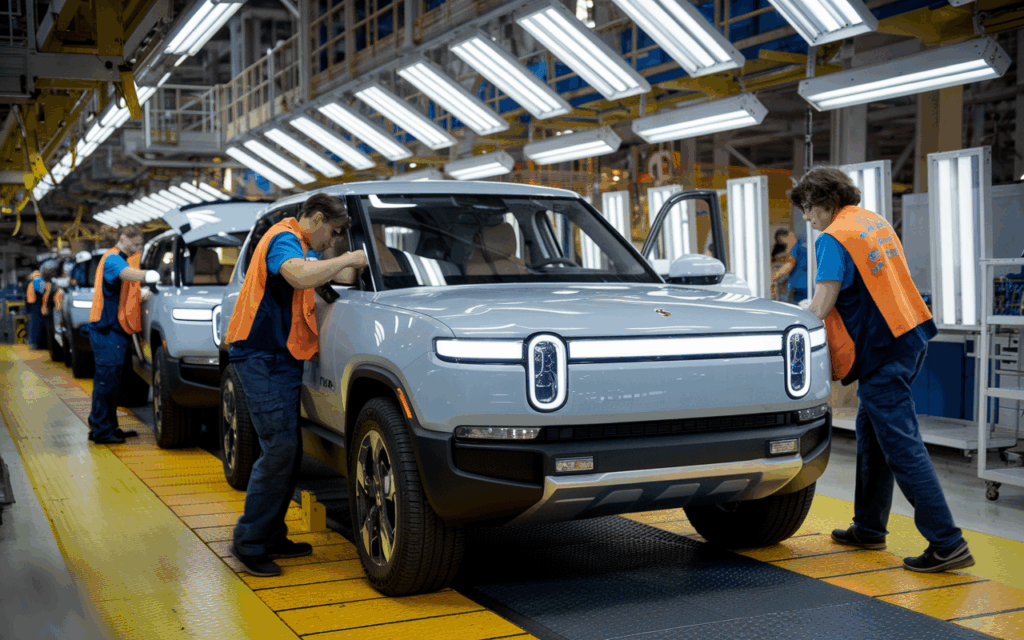Rivian's Workforce Cuts: A Tough Road Ahead as They Gear Up for the R2 SUV Launch 🚗⚡️
Rivian, the electric vehicle manufacturer that has captured the attention of eco-conscious drivers, is once again in the spotlight—not for innovation or groundbreaking designs, but for making tough decisions regarding its workforce. Recently, the company announced its second layoff this year, cutting approximately 150 jobs as it prepares to launch its highly anticipated R2 SUV. This comes on the heels of an earlier layoff where about 1% of its workforce was let go. It begs the question: what's happening behind the scenes at Rivian, and how does it reflect the state of the electric vehicle (EV) market?
According to a report by TechCrunch, most layoffs are within the commercial team, particularly impacting sales and service operations. While the affected employees are encouraged to apply for other positions within the company, it’s still disheartening to see job security wavering in an industry that was once thought to be bulletproof against economic fluctuations.
Rivian has been on a rollercoaster ride since its inception. The company, which started with about 15,000 employees globally, has had to make multiple workforce adjustments in response to the changing terrain of the EV market. Over the past two years alone, Rivian has laid off around 10% of its employees, following the mounting pressures of EV pricing and supply chain constraints. The scale of these layoffs serves as a stark reminder that even the most promising startups are vulnerable to market realities.
As Rivian prepares to roll out the more affordable R2 SUV, the stakes are high. The company's success hinges on its ability to compete with industry giants like Tesla, Ford, and GM, all of whom are ramping up their EV offerings. The R2 is seen as a pivotal product that could enable Rivian to expand its market share significantly.
The Bigger Picture 🌍✨
The reality for Rivian—and for many companies in the tech sector—is that navigating economic downturns often requires difficult choices. Layoffs, while unfortunate, may be a necessary step for companies aiming to innovate and sustain themselves in a competitive landscape.
In a world where technological advancement rides on the wave of economic viability, workforce reduction may sometimes pave the way for future profitability and growth. However, as consumers and stakeholders, it’s crucial to keep an eye on how these changes affect the company's culture, morale, and ultimately, its products.
What Does This Mean for Rivian's Future? 🔮
The coming months will essentially define Rivian's trajectory. With the launch of the R2 SUV on the horizon, the focus will undoubtedly return to its production capabilities. Will the workforce adjustments lead to enhanced efficiency, or will they pose challenges in meeting production targets?
As Rivian continues to navigate this tough terrain, the automotive and tech industries alike will be watching closely. It’s a critical juncture that could either solidify Rivian's standing as a disruptive force in the EV market or usher in more significant challenges as it moves forward.
As always, let’s stay tuned and see how this narrative unfolds within the ever-evolving EV landscape.
What are your thoughts on Rivian's recent layoffs? Do they signal deeper issues in the EV market, or is it just part of the growing pains associated with being in the tech realm? Let me know in the comments below! 👇
Feel free to share your insights using the hashtags: [#Rivian #ElectricVehicles] 🌟

More Stories
Meta’s AR Ambitions and AI Safety: Insights from the Equity Podcast
Insight Partners Data Breach: A Wake-Up Call for Cybersecurity Awareness
Lovable’s Ascendancy: Anton Osika at TechCrunch Disrupt 2025